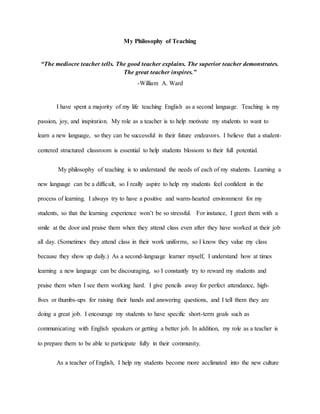
Inspiring English Learners to Succeed
- 1. My Philosophy of Teaching “The mediocre teacher tells. The good teacher explains. The superior teacher demonstrates. The great teacher inspires.” -William A. Ward I have spent a majority of my life teaching English as a second language. Teaching is my passion, joy, and inspiration. My role as a teacher is to help motivate my students to want to learn a new language, so they can be successful in their future endeavors. I believe that a student- centered structured classroom is essential to help students blossom to their full potential. My philosophy of teaching is to understand the needs of each of my students. Learning a new language can be a difficult, so I really aspire to help my students feel confident in the process of learning. I always try to have a positive and warm-hearted environment for my students, so that the learning experience won’t be so stressful. For instance, I greet them with a smile at the door and praise them when they attend class even after they have worked at their job all day. (Sometimes they attend class in their work uniforms, so I know they value my class because they show up daily.) As a second-language learner myself, I understand how at times learning a new language can be discouraging, so I constantly try to reward my students and praise them when I see them working hard. I give pencils away for perfect attendance, high- fives or thumbs-ups for raising their hands and answering questions, and I tell them they are doing a great job. I encourage my students to have specific short-term goals such as communicating with English speakers or getting a better job. In addition, my role as a teacher is to prepare them to be able to participate fully in their community. As a teacher of English, I help my students become more acclimated into the new culture
- 2. and the community. For example, I teach units on paying bills, using the post office, ordering food at restaurants, asking questions at work, attending their school-age children’s meetings or events, and applying for jobs. All of these skills are skills that many native speakers may take for granted, and these daily skills are ones that are necessary for success in this new country for my students. My units may be more simplistic because I teach beginning levels of English, but they are vital and much appreciated by students who want to embrace their new country and community. My journey as a teacher has taught me to be more flexible. I tried to use a variety of teaching methods and learning activities in my classroom. I adapt instruction to the needs of each student in a classroom, which is often called differentiated instruction. My goal is for my students to learn to read, write, and speak in English. I design my lessons by using the whole language approach. For example, I teach with big ideas or concepts using whole words and pictures, not sounds or phonics. I have students match words with pictures or definitions; select words from the story for vocabulary, and write words correctly (spelling). I provide prompts, such as how to begin simple sentences, how to answer questions, and how to complete sentences. (Ex. My favorite food is _______________.) My students are learning with entire words and sentences-not parts of words. I teach the students to ask questions in class even if they read the sentence I provided. (Ex. What time is lunch?) They are reading! Additionally, I teach body and language expression, which helps them understand the nuances or tiny hints about American culture and conversations like the shoulders going up to say someone does not know. Lastly, I believe student participation is a vital part of my teaching philosophy. I use listening and speaking activities that utilize pair work and group activities to encourage social interaction in the classroom. I often incorporate small group activities such as role play exercises, which give
- 3. the students the opportunity to speak and can be particularly beneficial to students who are more reluctant to speak in front of the class. They role play doctor/patient, mother/son, or food server/patron, and they learn so much by simply pretending. I provide prompts or questions and help them respond in complete sentences. (Ex. How are you feeling today? /How was school today, son? /What would you like to drink today?) Furthermore, when I teach reading to my students, I motivate them with stories that can be relatable to their everyday life such as stories about immigrants moving to a new country and starting a new life. I break the class into groups of three. Each student has the opportunity to read and answer questions. With the variety of strategies or methodologies I use, I am trying to reach every student. Some will be receptive to group activities while others may prefer the individual sentence framing. Ultimately, with the variety of activities, my students learn. Finally, my journey as a teacher has helped me to evolve, to be patient and to adapt to new teaching ideas, especially to keep up with new technology. Thirty years ago, I did not start my class with a power point filled with ice breakers or pictures of my family and me to introduce ourselves, but I do that now. Thirty years ago, I did not email my students or tell them about great websites to visit, but I do now. I am not the same teacher I was thirty years ago. I think I am a better one because I care and truly want my students to succeed.